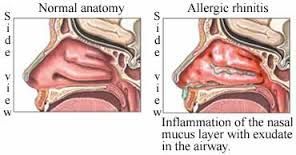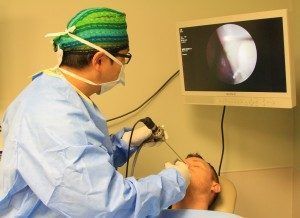Allergic Rhinitis
Allergic Rhinitis

Allergies can cause a wide range of symptoms including:
- Nasal congestion
- Itching of eyes, throat or skin
- Clear nasal drainage
- Plugging of the ears
- Decreased hearing
- Watering eyes
- Trouble swallowing or breathing
- Post-nasal drip
Treatment for allergic symptoms include:
- Prevention: avoiding exposure to the allergens that trigger your symptoms
- Some examples:
- Dust: consider a HEPA filtration system, removing carpet and drapes from the home
- Outdoor pollens and grasses: HEPA filtration system, keep windows closed, stay indoors during peak pollen hours
- Pet dander: do not let animals in the bedroom
- Nasal saline sprays (Ocean Spray, Xlear, etc.): rinses out allergens from the nose, moisturizes the nose, and reduces need for allergy medications
- Nasal steroid sprays (Flonase, Nasonex, Rhinocort)
- First line treatment for adults (in children, not recommended to be used for longer than 6 months)
- Treats the allergic reaction in the nose where it begins
- Reduce nasal congestion / swelling
- Can cause bloody noses: if this occurs, stop use for at least 2 weeks
- Over the counter antihistamines (Zyrtec, Allegra, Claritin)
- Prescription medications such as montelukast, azelastine, Dymista
- Immunotherapy: i.e. allergy shots, performed by an allergist
In some cases, a referral to an allergist may be made so that allergy testing (skin or blood test to determine what you are allergic to) can be performed.

Our Services
-
Ear
-
Nose
-
Throat
-
Head and Neck
-
Facial Plastic and Reconstructive Surgery
-
Sleep and Snoring
-
Pediatric ENT
Connect with Us Today
Whether you're seeking a second opinion or starting new with us, our team is ready to assist. Contact us today to schedule your first appointment.
Embark on your journey with our team, where science and humanity converge for superior otolaryngology care.
State-of-the-Art Care, Personalized for You
Copyright 2024. ENT LA. All Rights Reserved.
Privacy Policy
|
Terms & Conditions
|
Cookie Policy
| Sitemap
Powered By: Clinician Box
